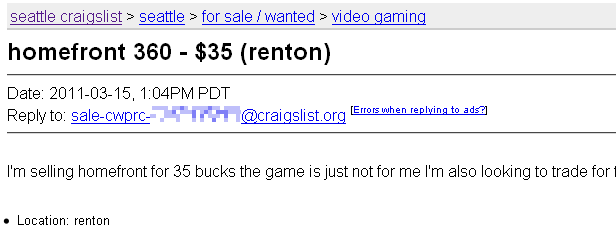
The biggest business in the world right now is cutting out the middle man. One way or another, that’s what many of the most promising start-ups and services are providing. It’s not so good for the middle man, of course, but some are more secure in their jobs than others. Taking advantage of the long tail and stocking or listing every item on earth is something Amazon will likely be doing for some time. But what about, say, a predatory business like GameStop, which is essentially a clearing-house for other people’s used property? It is, as we might say at one of our conferences, a prime target for disruption.
Gamestaq is a service that allows gamers to sell their used games directly to other gamers, for an automatically-generated standard price based on eBay and Amazon listings — so you know you’re not getting ripped off, though of course it’s also impossible to find a bargain. It’s intended to combine the best DNA from Craigslist and GameStop, and operate as transparently as possible.

The trouble with GameStop is that it’s taking advantage of its pole position in the $2 billion used-games market to push insane margins: buy a brand-new game from some kid for $20, and as soon as they leave the store, put it on the shelf with a $45 price tag. Kind of an arbitrary and malicious valuation, don’t you think? Yet it’s the standard, since GameStops are everywhere and the average gamer doesn’t really want to bother with the fraud risk and hassle of selling online via Craigslist or Amazon. Gamestaq’s service lets the game be transferred between the two end parties for a fair market value (no more, no less), and they stick a smallish fee in there ($1-2). So it’s still a middle man, but more of a matchmaker for buyer and seller. The prices end up being competitive for both parties, though of course since the buying and selling price are the same, it’s a delicate balance to maintain.
As for Amazon and Craigslist, they’re legitimate competitors but have their weaknesses. Amazon isn’t set up for someone who just wants to turn Bioshock 2 and Black Ops into cash, it’s made for people who want to be a small, very specific online store with low overhead. And Craigslist, well, we all know the risks there. I could buy Homefront today for $35 (it’s $60 new, $45-50 used, so that’s a bargain) but there’s no guarantee when I log on there that I’ll find what I want, and of course unless I do my research, there’s a good risk of over-paying — just saw $200 for a “practically brand new Wii” when actually brand new is well below that, for instance. Gamestaq hasn’t moved into selling consoles yet, but it should.

There are two interesting aspects to the system that make it viable. It didn’t occur to me until I looked at their FAQ, but if you don’t “buy” from a specific seller, how does a specific seller actually sell the game? Well, there’s a queue: first offered, first bought. It’s really the only solution, but it’s not ideal: no one wants to wait. So the second little innovation, which I think is very clever, is simply that when you submit a game for sale, you get a unique URL that you can spread on your own, which is linked to your specific copy of the game. So you can do legwork if you want, or just let it ride (you have to confirm it’s still available each week). It adds a competitive aspect (not to say gameification) so you don’t feel like you’re just submitting to the whim of some game-selling machine (again, an issue many have with GameStop).
And of course there’s nothing stopping you from offering it on Craigslist for the same price (or more), and removing the Gamestaq listing if it sells, or vice versa. It’s just another path for you to take, one that’s a little more regulated but still mainly a peer-to-peer sale.
The games market is unique in this “recycling” aspect. Gadgets, laptops, and other electronics tend to molder in closets since they depreciate so much, and movies and TV are so easy to rent or stream now that the second-hand market isn’t really practical. Digital downloads (of both media and games) are a threat to physical game reselling, but console games haven’t hit the tipping point yet for that, and I expect disc-based games will stick around for at least four or five more years as a standard method of protecting content. And money from selling games tends to go back into games — which is why GameStop has long offered a slight advantage to selling for in-store credit. They know it’s a good bet, and so does Gamestaq.
It’s long past time that GameStop’s stranglehold on the used game business was disrupted, and Gamestaq offers a way to sell which, for your average gamer, is simpler than Amazon and more reliable than Craigslist. It’s a no-lose situation for game sellers, and it can’t hurt to check for buyers, so with luck the service will take a bite out of the current market leaders and strike yet another blow against the middle man.